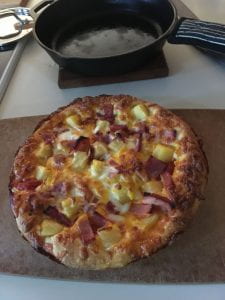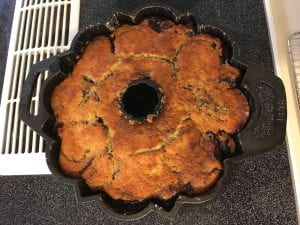1. What is your job and how long have you worked for the Dartmouth Biomedical Libraries?
I’m the Director of the Biomedical Libraries, I have worked here for 2 years and 2 months.
2. What is your favorite part about your job?
That’s a hard one, there’s a lot I like about my job. First, I like everybody I work with. Everyone’s been really supportive; the staff at Biomed and everyone at Geisel. I think we have a really good team – I feel very lucky because we have a good team.
Secondly, I get to do a lot of the things that I like to do. Not just managing, but working with the budget: I love working with data and spreadsheets! I get to do things I geek out about.
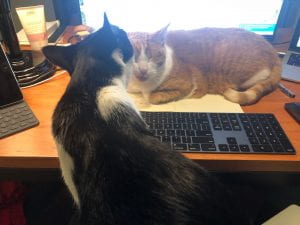 3. What is your least favorite part about your job?
3. What is your least favorite part about your job?
Let’s see, I’m going to say I don’t like my “coworkers” getting in my way! I have no personal space in my current work environment! [See question 5 for details]
4. How are you spending your isolation?
I have cooked so much, cooking and baking, which isn’t unusual since I bake a lot anyways but being here all the time means I’m always watching the oven. Baking is bad right now because then I can’t share it and have to eat it myself.
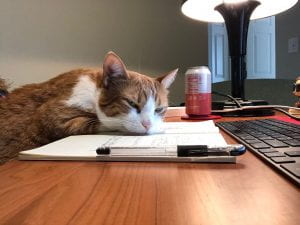 I’ve been lazy, I’m trying to get back on the exercise bandwagon so I’ve been better about running this past week. And I’m riding my bike a lot on the Rail Trail and out to Mascoma Lake and sitting by the water.
I’ve been lazy, I’m trying to get back on the exercise bandwagon so I’ve been better about running this past week. And I’m riding my bike a lot on the Rail Trail and out to Mascoma Lake and sitting by the water.
5. If you have any pets or kids, describe them as your co-worker and tell us what they are doing right now.
Max is sleeping on the job. He was invading my personal space prior to this. He then went to sit on top of Lola and licked her until she got sick of it and left in a huff. I need to file a grievance with HR.
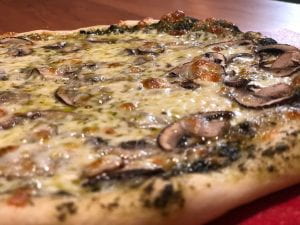 6. What pantry meal are you proudest of?
6. What pantry meal are you proudest of?
I don’t know, let me think. Actually, last night I just made Summer Pasta with Zucchini, Ricotta, and Basil. It was in the New York Times Cooking app, it was fabulous. You know what, I make pizza at least once a week in the winter and every 2 weeks in the summer. It’s the Roberta’s Pizza Dough recipe also from the New York Times Cooking app.
7. What are you reading/watching during your isolation?
I signed up for Acorn TV because I love British crime dramas. I watch so many: Vera, Wallander, Hinterlands, Grantchester. I’ve also been watching Bosch, and Ozark, and rewatching Elementary, and Community – I love that show, I’ll watch it during my lunch break. Basically a mix of things that are new and old. Oh, and Watchmen.
I’ve got a few books going but I tend to watch more TV. Things Fall Apart, by Chinua Achebe; The Night Watchman, by Louise Erdrich; Salt, Fat, Acid, Heat, by Samin Nosrat.
8. What is your hobby? Name your top 5 (hobby-related) recommendations and why.
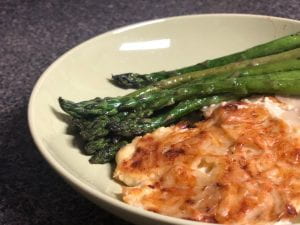 Cooking for sure:
Cooking for sure:
- Definitely go to farmers’ markets, or sign up for a CSA. Mine is from Root 5 Farm. Using local produce gives you access to food you’d never find in a grocery store. You find things you’ve never heard of, and it allows you to be adventurous in cooking.
- Sharing. The reason why I got into cooking was to have a way to share, which is why it’s killing me that I can’t do that right now. I used to watch my Nana cook, that’s how I learned, it was a social thing where the output was food and who wouldn’t love that? Now I can only eat it myself. Always share in non-pandemic times, it’s part of a bigger whole… it’s hard to explain!
- To learn, watch cooking shows. I grew up on PBS cooking shows like Julia Child and that kind of stuff. My mom wasn’t much of a cook, so watching shows is how I learned.
- Cookbooks. Treat them as books, actually read them, not just the recipe part. You can learn a lot by reading them. Cooking is science, if you understand the underlying concepts then it becomes something that you can extrapolate from. Then you can experiment once you know flavors and be adventurous.
- I don’t have a garden right now but I’d really like to grow plants. Having a garden would be nice to have.
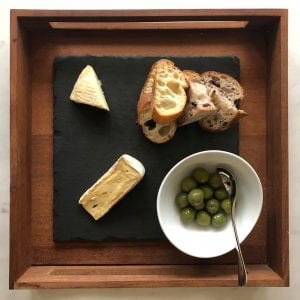 9. Where’s a favorite place you have traveled and where would you most like to travel to next?
9. Where’s a favorite place you have traveled and where would you most like to travel to next?
I’m going to continue with this food theme, I think I’m hungry! I went to Cinque Terre in Italy; a lot of it had to do with food. it’s beautiful, right on the Mediterranean. It’s where pesto and focaccia come from. Italy is all about food, you’ll eat dishes with 3 ingredients and it’s the most phenomenal thing you’ve had in your life.
I actually want to go to France. Weirdly I’ve never been to France even though I’ve taken 6 years of French! I want to eat all the cheese!
10. What frivolous things do you miss about being out in the normal world?
I don’t think this is frivolous, but seeing people, talking to people. I miss hugs! Yeah.
This post was written by the Water Cooler Committee, Samara Cary, Paige Scudder, Elaina Vitale, and Samantha Wiebkin, for the Biomedical Libraries.


